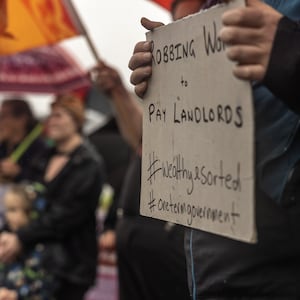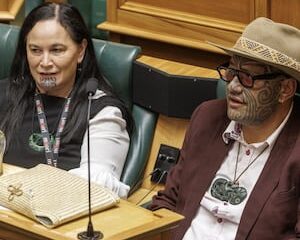Politics
Government Introduces New Law to Tackle Disruptive Protests

The Government is set to introduce a new offence aimed at curbing disruptive protests taking place outside individuals’ homes. This decision follows a notable rise in incidents targeting the residences of public officials, including Members of Parliament (MPs) and judges. Justice Minister Paul Goldsmith emphasized the necessity of the law to address this growing concern while still safeguarding the public’s right to peaceful demonstration.
Goldsmith stated, “We intend to stop this intrusive behaviour, while protecting the public’s right to demonstrate in a reasonable manner.” The proposed legislation outlines specific factors that will be considered when assessing the legality of protests. These factors include the time of day, duration of the protests, actions exhibited by the demonstrators, noise levels, and the proximity to the premises being protested against.
Balancing Rights and Public Safety
The new law aims to strike a balance between upholding citizens’ rights to express their views and ensuring that the home lives of individuals, particularly those in public service, are not unduly disrupted. According to Goldsmith, “The public’s ability to demonstrate is a cornerstone of our free and democratic society. It is a key way for citizens to express themselves and engage in political activity.”
This legislative move comes in response to numerous reports of protests that have escalated into disruptive events. The Government acknowledges that while demonstrations are vital for a functioning democracy, there must be limits to ensure personal privacy and comfort.
The introduction of this law reflects a broader conversation about the nature of public protests and the responsibilities of both demonstrators and authorities. As protests continue to evolve in form and frequency, the Government is taking proactive steps to manage these events without infringing on fundamental rights.
Public Reaction and Future Implications
The response from the public and advocacy groups remains to be seen, as the implications of this new offence could potentially reshape the landscape of protest rights. Critics may argue that such legislation risks stifling legitimate dissent, while supporters may welcome measures that protect individuals from harassment at their homes.
As the Government moves forward with this proposal, it will be crucial to monitor its impact on public protests and the rights of citizens to express their opinions. The balance between freedom of expression and personal privacy will undoubtedly continue to be a key issue in political discourse.
With this law, the Government aims to ensure that while the right to protest is preserved, it does not encroach on the rights of individuals to enjoy their homes in peace.
-

 Sports1 month ago
Sports1 month agoNetball New Zealand Stands Down Dame Noeline Taurua for Series
-

 Entertainment1 month ago
Entertainment1 month agoTributes Pour In for Lachlan Rofe, Reality Star, Dead at 47
-

 Sports1 month ago
Sports1 month agoSilver Ferns Legend Laura Langman Criticizes Team’s Attitude
-

 Entertainment2 months ago
Entertainment2 months agoKhloe Kardashian Embraces Innovative Stem Cell Therapy in Mexico
-

 Sports2 months ago
Sports2 months agoGaël Monfils Set to Defend ASB Classic Title in January 2026
-

 World3 months ago
World3 months agoPolice Arrest Multiple Individuals During Funeral for Zain Taikato-Fox
-

 Politics2 weeks ago
Politics2 weeks agoNetball NZ Calls for Respect Amid Dame Taurua’s Standoff
-

 Entertainment3 weeks ago
Entertainment3 weeks agoTyson Fury’s Daughter Venezuela Gets Engaged at Birthday Bash
-

 Sports3 weeks ago
Sports3 weeks agoHeather McMahan Steps Down as Ryder Cup Host After Controversy
-

 Entertainment3 weeks ago
Entertainment3 weeks agoTyson Fury’s Daughter Venezuela Gets Engaged at Birthday Bash
-

 World2 weeks ago
World2 weeks agoNew Zealand Firefighters Plan Strike on October 17 Over Pay Disputes
-

 Sports2 months ago
Sports2 months agoTragic Death of Shane Christie Sparks Calls for Player Safety




















